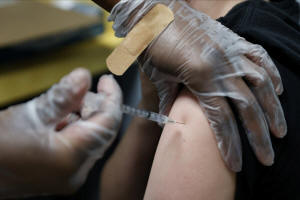Explainer: Should my teen get the COVID-19 vaccine?
 Send a link to a friend
Send a link to a friend
 [May 12, 2021]
By Michael Erman [May 12, 2021]
By Michael Erman
NEW YORK (Reuters) - The U.S. Food and Drug
Administration has authorized Pfizer and BioNTech’s COVID-19 vaccine for
use in children as young as 12, widening the country’s inoculation
program as vaccination rates have slowed significantly.
The following information should help parents deciding whether to
inoculate their adolescent children.
IS THE VACCINE SAFE FOR 12-15 YEAR OLDS?
The FDA found the vaccine to be safe and effective in Pfizer's clinical
trial. That trial included 2,260 participants in that age group, half of
whom received the same vaccine dose given to adults. The other half got
a placebo as a comparison group. The safety profile for those 12 to 15
was found to be similar to 16- to 25-year-olds who have received the
vaccine, the agency said. The most commonly reported side effects - all
of which were short lived - were pain at the injection site, fatigue,
headache, chills, muscle pain, fever and joint pain, the FDA said.
More than 2 million 16- and 17-year-olds in the United States have
already received at least one dose of the Pfizer/BioNTech vaccine.

CHILDREN DON'T USUALLY GET VERY SICK, SO WHY GET THE SHOT?
Most children with COVID-19 only develop mild symptoms or no symptoms at
all. However, children are not without risk of becoming seriously ill.
Pediatric medical experts point out that many children have been
hospitalized and some have died. Dr. Lee Savio Beers, president of the
American Academy of Pediatrics, encourages parents to get the vaccine
for their adolescents as soon as they are eligible.
Infected children, even those without symptoms, can still spread the
virus to vulnerable people at home and elsewhere. There have been
outbreaks traced to sporting events and other activities for children in
this age range. Inoculating as many people as possible is seen as
essential to breaking the back of the pandemic.
WILL I BE REQUIRED TO VACCINATE MY TEEN?
While states can require teens to get vaccinated in order to attend
public school, most are unlikely to do so before the vaccine receives
full approval. Such requirements often take legislation, which in this
case could be a lengthy and controversial process given how the vaccine
has been politicized in many parts of the country. Private schools may
be able to require it sooner unless a state law suggests otherwise.
[to top of second column]
|

A teenager is inoculated with Pfizer's vaccine against coronavirus
disease (COVID-19) after Georgia authorized the vaccine for ages
over 12 years, at Dekalb Pediatric Center in Decatur, Georgia, U.S.
May 11, 2021. REUTERS/Chris Aluka Berry

Summer camps - attented by some 26 million children each year - are
generally not regulated as tightly by states and have more freedom
to require or merely enourage vaccinations for staff and campers.
However, vaccinating kids could allow them to avoid quarantine if
they are exposed to someone who tests positive.
WHERE CAN MY CHILD GET THE VACCINE?
Teens will receive their vaccines at the same sites and pharmacies
that are administering them to adults, provided they have the
Pfizer/BioNTech shots on hand. They may also be able to receive the
shots at pediatric offices able to properly store the vaccine.
WHICH VACCINE CAN MY TEEN GET?
As of now, only the Pfizer/BioNTech vaccine is authorized for use in
people under the age of 18 in the United States.
ARE ANY OTHER COUNTRIES VACCINATING ADOLESCENTS?
Canada and Algeria have also authorized the Pfizer vaccine for this
age group. Pfizer has said it has submitted the data needed for
authorizaion to other regulators around the world, including the
European Medicines Agency.
(Reporting by Michael Erman; Additional reporting by Barbara
Goldberg; Editing by Caroline Humer and Bill Berkrot)
[© 2021 Thomson Reuters. All rights
reserved.] Copyright 2021 Reuters. All rights reserved. This material may not be published,
broadcast, rewritten or redistributed.
Thompson Reuters is solely responsible for this content.
 |